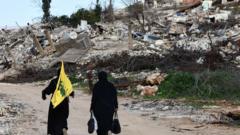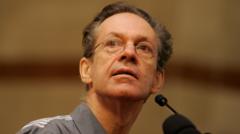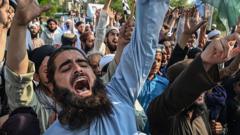Hezbollah's resilience is tested following a fatal war that has left the group struggling to maintain its support and goals.
Hezbollah Faces Uncertain Future after Devastating Conflict

Hezbollah Faces Uncertain Future after Devastating Conflict
As the group grapples with the aftermath of recent military blows, questions arise about its influence and survival.
Hezbollah is at a pivotal moment following significant losses in last year's war with Israel, where its strategies and member support are being severely challenged. On September 17, a series of explosive attacks originating from communication devices given to Hezbollah members resulted in numerous casualties and injuries, including a nurse named Adam, who was left maimed and blinded.
The group's decision to utilize low-tech pagers was a misguided attempt to protect its members from Israeli surveillance, which unfortunately became part of an elaborate Israeli operation involving concealed explosives. Despite Adam's severe injuries, he remained loyal to Hezbollah, regarding his wounds as honorable sacrifices.
However, the war has eroded Hezbollah's power both militarily and politically. With the onset of the conflict, many leaders, including longtime chief Hassan Nasrallah, were killed, and the group faced substantial casualties while losing weaponry and morale. Criticism of Hezbollah's engagement in the recent conflict has grown among its supporters, some of whom now question the group’s direction and military decisions.
As Hezbollah navigates reconstruction challenges in war-torn communities, discontent is growing over inadequate financial support, further complicating the group’s standing with its base. International pressure on Lebanon to disarm Hezbollah, particularly amid declining Iranian support, raises questions about the future of the group in a transformed political landscape.
The dilemma of disarmament looms large, given Hezbollah's deep connections within the Lebanese socio-political fabric and the potential for internal conflict if a resolution is not strategically managed. In the meantime, the group’s representation in parliament remains significant, but the newly elected president indicates a desire for central control over weapons.
In the wake of great loss, both Hezbollah and its constituents are left grappling with their identity and purpose in the face of an uncertain future. In this complex environment, questions linger about Hezbollah's viability and survival as it braces for continued scrutiny both domestically and internationally.



















